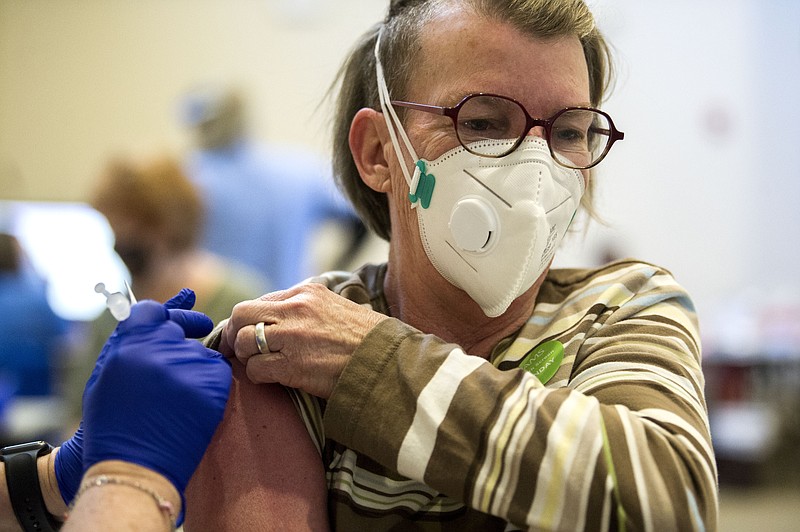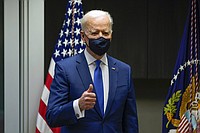WASHINGTON -- Americans can visit with others in small indoor gatherings without masks or social distancing once they've been fully vaccinated against covid-19, the Centers for Disease Control and Prevention said Monday.
"You can visit your grandparents if you have been vaccinated and they have been too," said Dr. Rochelle Walensky, the agency's leader.
[Video not showing up above? Click here to watch » https://www.youtube.com/watch?v=1cxdRKBlb4Q]
It's more complicated when vaccinated people mingle with unvaccinated people. She said those who are vaccinated can safely join small gatherings if the unvaccinated people are at low risk for serious disease. Mitigation steps like masks or spending time outdoors remain necessary if vulnerable people are involved.
The CDC is continuing to recommend that fully vaccinated people still wear well-fitted masks, avoid large gatherings and physically distance themselves from others when out in public. The CDC also advised vaccinated people to get tested if they develop symptoms that could be related to covid-19.
The CDC guidance did not speak to people who may have gained some level of immunity from being infected and recovering.
The announcement about the eagerly anticipated guidelines was made during a briefing by the White House task force on covid-19.
"We are starting to turn a corner," Walensky said. More than 31 million Americans have been fully vaccinated, and 59 million have received at least one dose. President Joe Biden has said there will be enough doses available by the middle of May to vaccinate every American adult.
There is still a small risk that vaccinated people could transmit covid-19, and Walensky said research continues.
The state of the pandemic has created a delicate balancing act for the White House's public health messaging. Officials have been encouraging people to get vaccinated as soon as possible and promised that "there is light at the end of the tunnel," in Biden's words. At the same time, they've pushed Americans to continue social distancing and wearing masks to limit the spread of the virus.
"This is a war," said Jeff Zients, the covid-19 task force leader. "We can't let up."
Officials say a person is considered fully vaccinated two weeks after receiving the last required dose of vaccine. About 31 million Americans -- or only about 9% of the U.S. population -- have been fully vaccinated with a federally authorized covid-19 vaccine so far, according to the CDC.
After a slow start, the pace of inoculations is accelerating, with 60 million people in the United States having received one shot and more than 31 million people fully vaccinated as of Monday, according to the CDC. On Saturday, 2.9 million doses were administered, a record, while about 2.2 million people on average are getting vaccinated daily.
The CDC will continue to update this initial guidance, perhaps loosening travel restrictions if new infections continue to decrease as vaccinations increase, Walensky said. But with more than 90% of the population still unvaccinated and levels of virus high, even those who have received the shots "might get breakthrough infections with lesser amounts of virus," she said, referring to a fully vaccinated person getting infected.
For now, officials are continuing to discourage travel because "every time that there is a surge in travel, we have a surge in cases in this country," Walensky said. "We know that many of our variants have emerged from international places, and we know that the travel corridor is a place where people are mixing a lot."
SECOND-GUESSING
The new guidance was "welcome news to a nation that is understandably tired of the pandemic and longs to safely resume normal activities," said Dr. Richard Besser, president and CEO of the Robert Wood Johnson Foundation and a former acting director of the CDC.
"I hope that this new guidance provides the momentum for everyone to get vaccinated when they can and gives states the patience to follow the public health roadmap needed to reopen their economies and communities safely," Besser said in a statement.
But some said the guidance is too cautious.
Dr. Ali Khan, dean of the University of Nebraska College of Public Health, said the guidance is reasonable in many respects -- with the exception of travel.
The CDC did not change its recommendations on travel, which discourages unnecessary travel and calls for getting tested within a few days of the trip. That could seem confusing to vaccinated people hoping to visit family across the country or abroad.
"They need to relax travel for those vaccinated" and to immediately publish electronic standards for documents that show whether a person is fully vaccinated, said Khan, who formerly was a leading CDC disease detective.
The new guidance also says nothing about going to restaurants or other places, even though governors are lifting restrictions on businesses, said Dr. Leana Wen, an emergency physician and public health professor at George Washington University who formerly was Baltimore's health commissioner.
Wen has said the CDC should have had some kind of post-vaccination guidance ready in January, when some people first began to finish their second doses. And she called the guidance that came out Monday "far too cautious."
"The CDC is missing a major opportunity to tie vaccination status with reopening guidance. By coming out with such limited guidance, they are missing the window to influence state and national policy," Wen said in an email.
But some people who are fully vaccinated were pleased by Monday's news.
Ruth Michienzi was among those receiving her second and final vaccine dose at a pharmacy in a Stop and Shop supermarket in Woburn, Mass., on Monday morning.
The 91-year-old resident of nearby Burlington said she's fine with having to still wear a mask in public and follow other safety guidelines even after being fully vaccinated.
But Michienzi also said she's excited to finally be able to take off her mask in front of her three great-grandchildren. She's seen them in person since receiving her first shot about a month ago, but has kept her mask on.
"I hope they remember me," she said.
"I've been doing all of that for a year, and I don't want that year to be wasted," Michienzi said of the safety regulations. "I think it's smart to wait."
Grace McShane, 61, of Melrose, also received her second dose Monday.
She said she qualified for the vaccine because she's high-risk, including suffering a heart attack last year. The in-home caregiver said she too was fine with the continued restrictions even after being vaccinated.
"Even if you're vaccinated, it's better to be safe than sorry. This is the new normal. This is part of life and you just have to adapt to it," McShane said.
She said she's looking forward to hugging her three grandchildren without having to wear a mask. Her grown children have also been vaccinated as essential workers, she said.
"Just cuddle and give them hugs," McShane said. "That's all I want to do."
SPRING BREAK BROKEN
Meanwhile, colleges around the U.S. are scaling back spring break or canceling it entirely to discourage partying that could spread the virus and raise infection rates back on campus.
Texas A&M University opted for a three-day weekend instead of a whole week off. The University of Alabama and the University of Wisconsin-Madison also did away with spring break but are giving students a day off later in the semester.
Even some students who have the time to get away aren't in the mood. Michigan Tech's weeklong break began Friday, but 21-year-old Justin Martin decided to visit family in Michigan instead of making that epic senior-year trip to Florida he once envisioned.
"I don't want to travel all that way, first of all, especially with everything being shut down. It just doesn't seem worth it, especially with covid too," he said.
To be sure, many college students looking to blow off steam or escape the cold and snowy North are still going to hit big party spots such as Florida, Mexico, California and Las Vegas to soak up the sun and go bar-hopping at night. Others will go skiing in the mountains or hit other tourist spots.
But many others say they will be reluctantly skipping trips this year.
"Definitely, no planned trips. Definitely wearing masks this year," said Brady Stone, a 21-year-old journalism major at Texas A&M. "We are kind of hunkering down and staying safe." He added: "I think most of us, if we are going anywhere, it is back to their hometowns."
Tourism is the Sunshine State's No. 1 industry, generating over $91 billion in 2018, and last year spring break was one of the first big casualties of the pandemic as the U.S. went into strict lockdowns, shutting down beaches across Florida just as alarming scenes of college students heedlessly drinking, dancing and getting up close without masks were plastered across social media.
Miami tourism officials say they lost billions of dollars during those three months last year.
Now, those beach towns are hoping to make up for some of those losses, even as they take precautions to discourage reckless behavior and curb the spread of the virus. Miami tourism officials have spent $5 million on the city's biggest national advertising campaign in 20 years.
California, meanwhile, is discouraging visitors from out of state, warning tourists they will have to quarantine for 10 days on arrival, and a season that ordinarily would see crowds at beaches, theme parks and ski mountains is expected to be thin. The state, with miles of coastline and popular spring break spots like Disneyland and the Santa Monica Pier, has some of the nation's toughest pandemic restrictions.
At the University of Mississippi, which canceled spring break and will instead end the semester a week early, senior Eliza Noe had been planning a "last hurrah-type getaway trip" with her girlfriends, but that isn't going to happen now.
"Spring break is your last moment to lose your mind before becoming an adult, so that was kind of the plan," she said, "but then the world ended."
Information for this article was contributed by Chris Megerian of the Los Angeles Times; by Heather Hollingsworth, Kelli Kennedy, Anila Yoganathan, Mike Stobbe, Phil Marcelo and Zeke Miller of The Associated Press; and by Lena H. Sun and Lenny Bernstein of The Washington Post.


